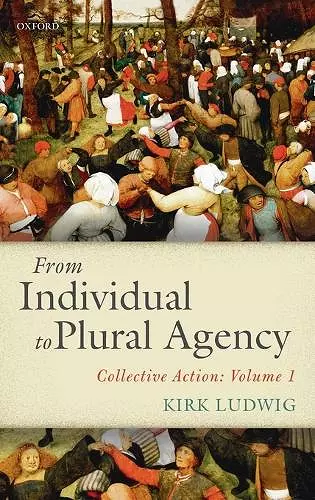From Individual to Plural Agency
Collective Action: Volume 1
Format:Hardback
Publisher:Oxford University Press
Published:13th Oct '16
Currently unavailable, and unfortunately no date known when it will be back

Kirk Ludwig develops a novel reductive account of plural discourse about collective action and shared intention. Part I develops the event analysis of action sentences, provides an account of the content of individual intentions, and on that basis an analysis of individual intentional action. Part II shows how to extend the account to collective action, intentional and unintentional, and shared intention, expressed in sentences with plural subjects. On the account developed, collective action is a matter of there being multiple agents of an event and it requires no group agents per se. Shared intention is a matter of agents in a group each intending that they bring about some end in accordance with a shared plan. Thus their participatory intentions (their we-intentions) differ from individual intentions not in their mode but in their content. Joint intentional action then is a matter of a group of individuals successfully executing a shared intention. The account does not reduce shared intention to aggregates of individual intentions. However, it argues that the content of we-intentions can be analyzed wholly in terms of concepts already at play in our understanding of individual intentional action. The account thus vindicates methodological individualism for plural agency. The account is contrasted with other major positions on shared intention and joint action, and defended against objections. This forms the foundation for a reductive account of the agency of mobs and institutions, expressed in grammatically singular action sentences about groups and their intentions, in a second volume.
The book is rich in content and extensive in scope. There are useful summaries in (and of) both parts. On the whole, the book is an exceptionally well-argued, high-level contribution to analytic single-agent and plural-agent action theory...it is rewarding especially for those who are interested in technical analyses. Also other philosophers will find his discussions interesting. Ludwig normally goes right into the core of important issues, and does not shy away from saying what he thinks about particular views or arguments. Undoubtedly the book is a great achievement and is strongly recommended for action theorists. * Raimo Tuomela, Notre Dame Philosophical Reviews *
This book is without doubt an impressive achievement, and there is much to learn from the authors meticulous approach. I suspect few readers will be drawn in by Ludwigs focus on the logical form of action sentences, but much Of the book can be appreciated independently of this. The explanatory aim of his overall reductive project is refreshingly ambitious and wide in scope. The arguments by which he pursues it are illuminating and mostly convincing. I wholeheartedly recommend this book to those interested in action theory in general, and to those focused on joint agency in particular. I am looking forward to reading volume 2. * Olle Blomberg, The Philosophical Quarterly *
ISBN: 9780198755623
Dimensions: 240mm x 157mm x 23mm
Weight: 616g
336 pages